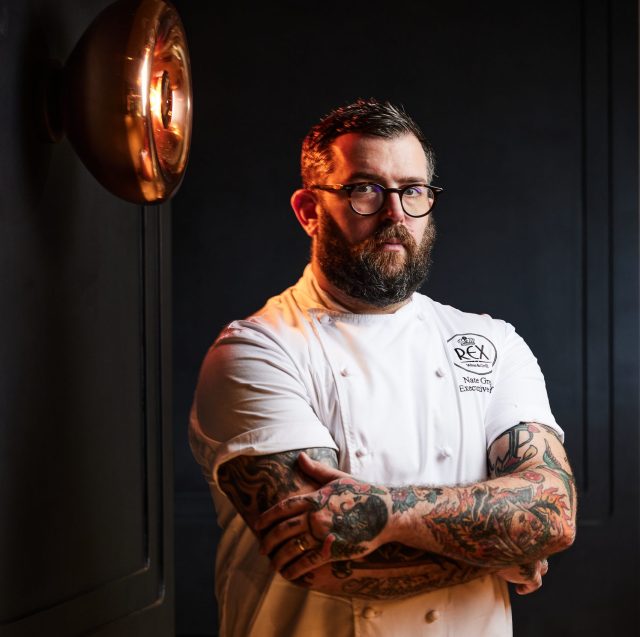db meets: Nathan Green
The executive chef of Hong Kong’s Rex Wine & Grill talks about working in the best of British kitchens, his love of combat sports, and the shortcomings of this generation of chefs.

You have trained with some of the most influential Michelin-starred British chefs. What have they taught you?
“When I joined Gidleigh Park with Michael Caines I was 19, and I was actually getting ready to quit the industry. He kept me cooking by bringing me into a real kitchen. That generation of chefs instilled this work ethic that if you put your mind to something you can do it, no matter how exhausted you are. In hindsight, some of it wasn’t so healthy, but there’s a lack of commitment and work ethic today. I’ve got no issue with chefs working their 55 hours a week – everyone deserves some time off – but the problem now is that they don’t want to work hard. A lot of them now, certainly in Hong Kong, don’t really care where they work. They’d rather go to a restaurant that’s dead and get paid and do nothing all day. They don’t really care if the restaurant shuts, they just move to another restaurant.”
Is there anything you’ve chosen to leave behind from those early experiences?
“The main thing that I’ve dropped from the old school mentality is the screaming and shouting. Of course there are always moments, and I’m not going to say I never do, because I’d be lying, but I find it doesn’t help. Going forward, it’s better to ask people ‘you don’t seem on the ball today, what’s up?’. It gets harder because, like I say, at the moment you just don’t feel like they care. I’m at a point now where I just think ‘fuck it, I’ll do it myself’, which is a shame, and I think a lot of what the old school did was good. I certainly wouldn’t be where I am today without it.”
What is your perspective on The Michelin Guide?
“I’ve kept away from doing Michelin-starred fine dining because I didn’t want to drive myself crazy. That’s why I chose to go into a steakhouse, because as long as the steak’s cooked and seasoned perfectly, there’s nothing to get too pissed off about. I am a firm believer that the Michelin-star system should be fine dining restaurants only. I have two little kids, and I have things I love doing outside of my job, and once you start getting stars, there’s a real pressure on you to be there every single service. You have to live and breathe it. I was very much like that when I was in my 20s. But then I hit my 30s and wanted to have a girlfriend and make a family and have a life.”
Partner Content
What influenced you to move to Hong Kong in 2014?
“I was coming up to being 32 and I was £30,000 (HK$297,000) in debt. I’ll put it like this – I was a head chef in London in a Michelin-starred restaurant and my take-home pay after tax was £2,000 a month. That’s what I pay a commis chef here. You’re the top of the food chain and you earn no money. I just got tired of that.”
How would you describe the Hong Kong dining scene post-Covid?
“Everyone was optimistic that things would bounce back. Every month we find ourselves saying next month it’ll be ok. There is a sense of anger towards how things have been run. We don’t feel like there is enough being done to bring in tourism and encourage people to come here and do business. People ask me all the time why don’t you leave Hong Kong? OK, it’s tough times right now, but tough times don’t last forever, and where are you going to go? England’s a mess, Australia’s a mess. Most places around the world are a mess as well, but they don’t have 10% tax.”
How important a role does wine play in the customer experience at Rex?
“We’re a steakhouse so pretty much every customer drinks wine. We run a wine-membership programme here, with 100 lockers for 100 guests, so you pay an annual fee and waive your corkage in the restaurant. We also dropped the mark-ups on our wines quite a lot because I’d rather people pay on the food because that’s where the labour’s at. At the end of the day, what’s the point of having wines that would never sell just holding up inventory? I’d rather make HK$400 on the bottle than never sell it and make nothing.”
Your other great passion in life is jiu jitsu. Why do you love it?
“I went through a period when I was in Hong Kong of really bad depression. At that point I was suicidal, and jiu jitsu helped a lot. It gave me an outlet for my aggression. I don’t want to sound like a neanderthal, but it makes you feel like a man. We’re supposed to fight, we’re supposed to hunt, and we’re supposed to provide. A lot of guys in today’s society don’t get to do that. They’re driven down by their bosses or they do a mundane job stuck behind a keyboard, and they don’t get an opportunity to do what we’re supposed to naturally do. We’ve got chefs, bankers, billionaires, students, immigrants, we’ve got guys from every walk of life at the gym, and when you’re on the mat, everyone’s equal.” dba
Related news
Volatile first quarter for fine wine, but there is optimism on the horizon




